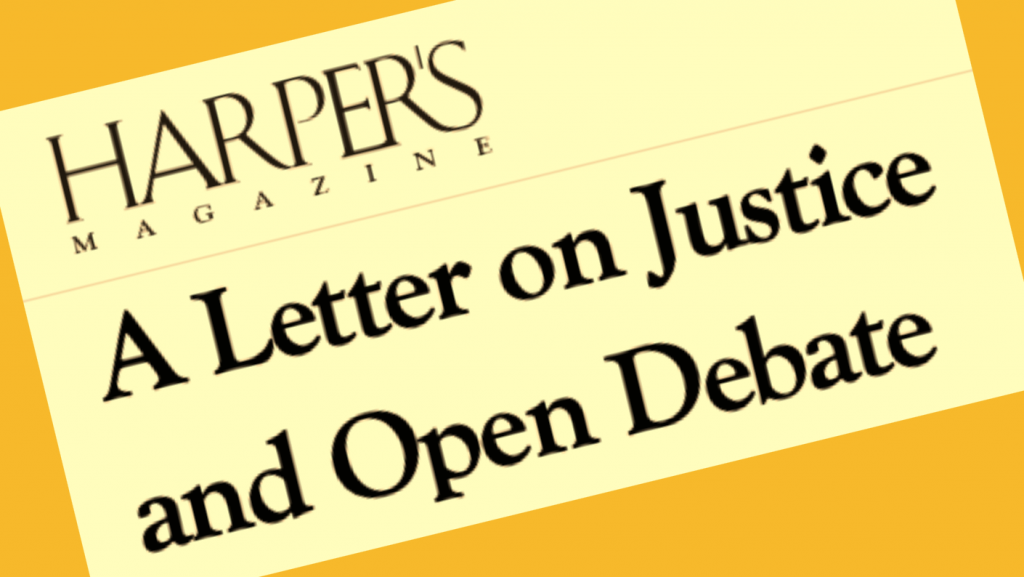
Two recent incidents highlight the need to promote robust debate about ideas, and to protect people from defamatory smears.
150 writers published an open letter in Harper’s Magazine about justice and open debate, and politician Mary Lou McDonald settled a defamation case arising from a tweet about her.
The two incidents together encapsulate a problem that I have highlighted for years. Authoritarians and online mobs seek both to silence legitimate debate about important issues, and to smear people with false personal allegations.
Promoting open debate
I welcome this week’s open letter by 150 writers in Harper’s Magazine about justice and open debate. They applaud recent moves towards challenging social injustices, while warning of the dangers of a new ideological conformity.
They warn that the free exchange of information and ideas, the lifeblood of a liberal society, is daily becoming more constricted. They challenge the recent vogue for public shaming and ostracism, and recent calls for swift and severe retribution in response to perceived transgressions of speech and thought.
Protecting people
Mary Lou McDonald’s successful defamation case is a useful reminder that the laws of defamation apply equally on social media. Former Fianna Fáil TD Declan Breathnach apologised in the High Court for a tweet that he wrote about the Sinn Féin leader nearly two years ago.
“I deeply regret that I made these unfounded and damaging accusations and I retract them in full,” he said. “I unreservedly apologise to Ms McDonald for the upset and distress caused by my comments and for my unjustified attack on her reputation.” The other terms of the settlement were confidential.
My own experience
I try to robustly criticise harmful ideas using reason and evidence, while being respectful to the people who hold them. I promote open debate that does not involve threats of violence or defamation of people who disagree with you.
I promote that we should tackle prejudice through education, and tackle prejudice-motivated crime through the law, while protecting the right to freedom of expression, based on human rights principles and standards.
I have spent decades actively campaigning against terrorism and State injustices, promoting liberal values on personal and social issues, and working with Christians and Muslims on secular issues.
Despite this, some people online have absurdly described me as bigoted, sexist, racist, fascist, Nazi, xenophobic, homophobic, Islamophobic, misogynistic, transphobic, and transmisogynistic. One blogger even claimed that I defend, support, and provide a haven for rapists.
We need to have strong words that are carefully used to condemn the world’s most harmful beliefs and behaviours. But these words have now been devalued to the extent that they are almost meaningless by people throwing them around like confetti.
I have at various stages responded to these smears by reasoned analysis, and more recently by ignoring them because of the time that it takes to respond effectively and because some people are not engaging in good faith. I have at times come close to taking a defamation case, and I still might do that if the need arises.
The role of satire
I wrote last week about three online storms that made me concerned about the future of humour online, with online mob outrage about jokes leaking into mainstream media and employment matters.
Satire has an important role in open debate by challenging harmful ideas. That includes satire that offends people. But some people use satire to smear people, believing that using satire will protect them from a defamation case. They are mistaken.
Satire can be defamatory if it refers credibly to an identifiable person, or if it refers to an imaginary person but creates the impression that an identifiable person deserves to be compared to the type of person that it refers to.
Summary
These two recent incidents have highlighted the need to both protect robust debate about ideas, and to protect people from defamatory smears. I will continue to robustly criticise harmful ideas using reason and evidence, while being respectful to the people who hold them.
I am not familiar with the Mary Lou McDonald case, but I am very pleased that so many prominent persons signed the Harper’s Magazine letter about justice and open debate. The slanderous habits of many people on line is literally insane. Accusations such as “fascist” have, as you point out, been overused to the point of losing all meaning. Well not all meaning. Such specious accusations still communicate a toxic attitude which poisons debate. Many of those who consider themselves to be on the “left” have abandoned Enlightenment values of reason and universalism. In doing so, they strengthen the political right and far-right, even as they accuse anyone who disagrees with them of being on the far right. Their hypocrisy is overwhelming.
I’m so pleased that people whom, largely, I respect have taken this action. It also reminds me that in my small way I have been one of the “don’t say what I really think because I’ll be denounced” group.